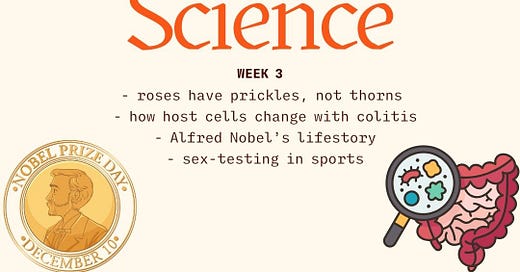Our gut's memories, sex-testing in sports, prickles of roses, and Alfred Nobel's life
This week we learn about roses with prickles (not thorns), how cells in our gut remember colitis, Alfred Nobel's life story, and sex-testing in sports.
How Did Roses Get Their Thorns?
By Carl Zimmer (NYTimes)
Prickles, not thorns adore the stems of roses. In the eyes of a botanist, thorns are modified stems; prickles are plant’s skin poking out. Roses, grasses and some potatoes – all grew prickles independently but why evolution picks prickles repeatedly is elusive. A new study found one gene copied multiple times in the genome of eggplants. One version of this gene could make the eggplant have prickles; another version would simply help the plant cells to grow. Scientists think this knowledge could help us make plants prickle-free to cultivate them easily in the future.
A Cellular Atlas of Gut Inflammation
By Alejandra Manjarrez (Source: TheScientist)
In a mouse model of colitis, scientists wanted to study how the gut changes as the disease progresses. One of the many cellular residents of our gut, fibroblasts were getting sicker even after the mice were no longer sick of colitis. This can reveal why some people who previously suffered from inflammatory bowel disease go into remission or experience symptoms again.
Maybe fibroblasts relive the bad times again!
Alfred Nobel: An Explosive Innovator
By Smart Tea
If you have heard of the Nobel Prize, you must have wondered about Alfred Nobel. This podcast episode takes a deep dive into the story of Alfred Nobel. We learn about his upbringing, his many inventions and his obsession of making a safer alternative of nitroglycerine. We learn why he dedicated his fortune to the Nobel Prizes; I can’t tell you yet, you must listen to the episode.
The Long History of Sex Testing In the Olympics and Other Elite Sports
By Rachel Feltman, Fonda Mwangi & Jeffery delviscio (Source: SciAm)
Can biology really advantage someone to win a sports category? This podcast episode delves into the how it was believed that women could turn into men if they played sports. As we listen to years of sex-testing policies, we arrive at the present – the tug of war between the people who make rules and scientists/doctors advocating that these tests mean nothing at all. These tests are expensive, discriminatory and often force women to artificially lower their testosterone – something they may not know about until they arrive at the Olympics or even have the means to do in their home countries.
Thanks for stopping by,
Ananya
A sneak peak of the weird and wonderful ways science impacts us everyday will be delivered to you every Tuesday and Thursday in a series I call “Slice of Science”! I am highlighting science stories (and exceptional writers) that find their way to me - if you are interested to keep reading more, subscribe & share this with someone!



